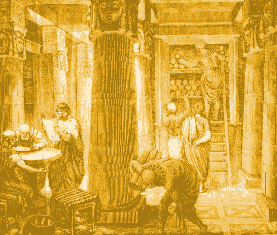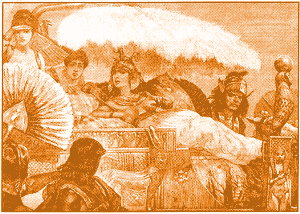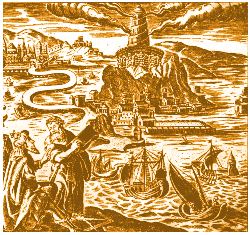 |
Alexander's library rises from the
ashes
|
|
The Egyptian government is trying to recreate the "Bibliotheca Alexandrina"
on the site of one of the seven wonders of the world.
Alan Philps and Alasdair Palmer
The original library at Alexandria in Egypt was one of the
wonders of the ancient world. Founded by Alexander the Great in the fourth
century BC,built and enlarged by Ptolemy I,Alexander's successor,the city's
library comprised perhaps as many as 700,000 manuscripts - the whole corpus
of knowledge accumulated by ancient philosophers,scientists and poets.And
it was all contained in a building thought by the ancients to have been of
surpassing beauty,not a trace of which survives .
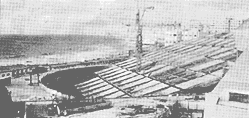
Now the Egyptians are building a successor to Alexander the
Great's library,a building that Professor Mohasen Zahran,the man in charge
of construction, believes will rival the ancient original. It is not based
around an elegantly colonnaded portico,as the original seems to have
been.Instead,it is a 10-storey concrete cylinder,a third of it below sea
level,inclined at an angle of eight degrees.Without windows,it has walls
studded with 4,600 carved granite panels.As Jack Thompson,the Englishman
who is building it,says,"It is a most unusual building." And its sole purpose
will be to house objects that the internet threatens to make obsolete:books.
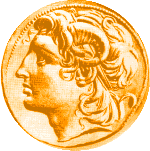
So what are the citizens of Egypt,one of the world's more
impoverished countries doing spending £112 million on building it? Prof
Zahran,who commissioned it the Norwegians who designed it,conceives it as
an opportunity "to put Alexandria back on the cultural map". The city was
the centre of the cultural world for three centuries before the birth of
Christ and for at least two after it.Since then, Alexandria has moved inexorably
from the centre to the periphery of the world of learning. The new library
is meant to change that."Our vision," explains Prof Zahran,"is for the library
to become one of the central points in the city from which other activities
stem.We see it as similar to the impact of the universities of Oxford and
Cambridge on their respective cities."
Ptolemy's original library certainly had that effect on
Alexandria.A cultivated Greek soldier who was handed the city (along with
the rest of Egypt) as a reward for his role in Alexander the Great's campaigns,he
was depressed by the ignorance of the "barbarians" he found himself ruling.
In 306 BC, he began collecting the works of the greatest Greek scholars of
the time,in order both to educate his people and to start a "universal synthesis"
of knowledge.He happened to be living during one of the most intellectually
creative periods of humankind when Greeks were writing the books that would
become the foundations of Western philosophy,mathematics,science,medicine,history
and literature.
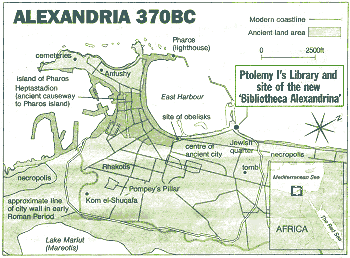 |
| The library at Alexandria,founded by Alexander the Great in the fourth century BC,was one of the wonders of the ancient world. Today,the only wonder is why the city is building a successor near the site of the original at a cost of £112 million. |
Acquiring the works of
Plato,
Aristotle,
Thucydidies, Sophocles, Euripedes, Hippocrates and
Euclid - just a few of the geniuses who
were either hard at work when Ptolemy was collecting manuscripts or not long
dead - ensured that Ptolemy's library quickly became a magnet for
intellectuals,and Alexandria became reknowned as a city for scholars.Head
librarians included the mathematician Archimedes and the astronomer Aristarchus.
Will the new library - the "Bibliotheca Alexandrina",as Prof Zahran and his
colleagues call it,as a reminder that is a replacement for the original -
have the same effect on the modern city? David Wardrop,the secretary of the
UK Friends of the Alexandria Library,is not wholly convinced,partly because
of the new library's rather haphazard policy for acquiring books."They have
been appealing for books from around the world and have received lots of
gifts," he notes."But we think they should first adopt a policy on what they
want."
The library does not,as yet,even have a librarian:there is
no successor to Archimedes and Aristarchus."In our view,they should have
appointed a librarian before they installed a book transport system [which
is in place and uses the latest computer-controlled technology].At this stage,"he
adds,"They do not know which books are going to be in most demand." There
have been insistent calls for the library to sharpen its priorities - calls
that Prof Zahran,a town-planner by profession,has consistently ignored."This
new building will be a new Alexandrian lighthouse,"he proclaims,which is
not reassuring to critics who thought it was supposed to be a library."It
will be a beacon of knowledge.It will inherit the high goals of the ancient
library."
But critics see little evidence of high goals in the
indiscriminate book appropriation policy. They believe the library would
be much better served if it really did focus on its past,becoming a unique
centre for the study of science in antiquity (practically every other scientist
of note in the ancient world studied there),the Coptic Church and Islam.
Prof Zahran is unmoved by that suggestion. He says most of the books that
he has received relate to the arts and humanities, but he hopes to expand
the titles to cover the whole of science and technology.
|
Cleopatra: pivotal in the history of the library. |
It is true that the collection in the original library ranged
over the whole extent of human knowledge as it existed in the ancient
world.Manuscripts,written on papyrus,were stored in rolls,Callimachus,the
Greek poet,is supposed to have come up with the first catalogue while sorting
manuscripts there. Papyrus is,of course, extremely flammable,and the library
was burnt down several times - first by Julius Caesar in 48BC,when he arrived
to occupy the city and court Cleopatra.His friend Mark Anthony - who avenged
Caesar's murder and then became infatuated by Cleopatra - is said to have
rebuilt the library to impress Cleopatra by giving her 200,000 manuscripts
(history does not record what she thought of the gift).
The Library survived intact for more than 200 years. Then,in
AD270,the brutal emperor Aurelian arrived,sacked the city,which had revolted
against his rule,and burnt down the library,destroying all the manuscripts
in it. But the library- or at least a library - was rebuilt.A new collection
of manuscripts was assembled.But at the end of the fourth century,a riot
by fanatical Christians,who were angered by the presence of pagan
learning,led to a new bonfire,this time just of the manuscripts,not the building
that contained them. And "20 years afterwards",as Edward Gibbon wrote
in "The Decline and Fall of the Roman Empire"
[Ref:Iotm64],"the appearance of the empty shelves
excited the regret and indignation of every spectator whose mind was not
totally darkened by religious prejudice".
Even that was not the end of Alexandria's library.That came
when the city was conquered by the Muslims in 638.Omar,the victorious
caliph,was asked what should be done about the library - now restocked with
an extensive new collection of manuscripts."If the writings of the Greeks
agree with the Koran," he is supposed to have said,"They are useless and
need not be preserved.If they disagree,they are pernicious and ought to be
destroyed." The manuscripts were then used as heating fuel for Alexandria's
4,000 public baths,a conflagration that led Gibbon to comment that "if the
ponderous mass" of religious writings on the "Arian and Monophysite controversy
were indeed consumed in the public baths,a philosopher may allow,with a
smile,that it was ultimately devoted to the benefit of mankind".
Whether the story of Caliph Omar's destruction is true or not
- and most historians now think it is not - Alexandria's library never
recovered.The city began its long decline into a fishing village,but neither
is it a "wonder of the world".It is a bustling,crumbling,peeling port.The
new library will be one of the few buildings to look as if it might stay
up. Ever alter to the fate of its predecessor,the new buildings' designers
have provided it with the most modern fire-prevention technology.As soon
as smoke or fire is detected,and inert gas is forced into the room under
high pressure,immediately dousing the flame without wetting the books - which
is what happens with sprinkler systems.
It sounds terrific.But will it work? It is not reassuring
to discover that President Mitterand was one of the main advisers when the
project was instigated.His new library in Paris has proved a disaster,with
the computer aided stacking system either breaking down or permanently damaging
- or losing - the books. More alarming still is the thought that the building
will be redundant from the moment it is completed.When the library was designed
a decade ago,few people had heard of the internet.But,as the entire corpus
of the world's documents becomes digitised,what is the point of a library?
Why have a building to store books when you can send,and receive,their contents
in your home? That is not the question to which the designers,or their
patrons,have an answer.
|
| The lighthouse, not the library, at Alexandria was a wondrous sight |
Casting light on the Seven Wonders
Further to your feature "Revising Lost Glories" (Focus,March
12) the Seven Wonders of the World were (in any order) the Hanging Gardens
of Babylon,the Colossus of Rhodes,the statue of Zeus on Mount Olympus,the
Temple of Diana at Ephesus,the Tomb of Mosul at Halcarnassus,the Pyramids
of Egypt and the Pharos (lighthouse) of Alexandria.
Contrary to your authors' repeated assertion,the library of Alexandria
was not among them Indeed,it could not have been because, while the label
"Seven Wonders of the World" was post-Alexandrian,it was immediately so,implying
that they were the seven structures which most impressed Alexander the
Great,whereas the library was built after his death.
N F Parker London SW1
